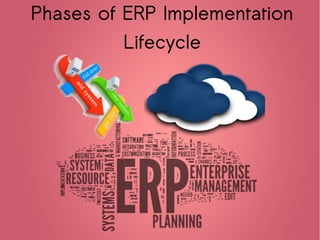
erplifecycle-141107014844-conversion-gate02
- 1. Phases of ERP Implementation Lifecycle
- 2. What is ERP? ERP is IT software that combine business acivities across an enterprise. It works from product planning, inventory control, product distribution to order tracking. ERP has two leading vendors which are SAP & Oracle. ERP application is segment for the finance, accounting & human resources phases of business.
- 3. ERP Implementation ERP implementation lifecycle focus on the ERP project which is carried out to make ERP up and running. ERP project is go through different segments same as any other project. Most often these segments do not essentially depend on one another in a sequence, i.e. one segment might start before previous segment has finished. All segments that will be discussed may not be applicable in all cases.
- 4. Different Phases of ERP Implementation Pre-evaluation Screening Package Evaluation Project Planning Phase Gap-Analysis Reengineering Configuration Implementation Team Training Testing Going Live End-user training Post – implementation
- 5. Pre-evaluation Screening When the company hase agree to implement ERP, they have to search for the convenient & appropriate ERP package.
- 6. Package Evaluation In this segments, find the package that is flexible enough to meet the company's need or a software that could be customised to obtain a good fit. Important Points to remember while evaluating ERP software: − Functional fit with the company’s business process. − Degree of integration between the various components of the ERP system. − Flexibility and scalability − Complexity − User friendliness − Quick implementation
- 7. Project Planning Phase In this segment details of how to go about the implementation are decided. Project plan is developed, roles are identified & responsibilities are assigned.
- 8. Gap Analysis ERP Implementation's this segment is crucial for the success of the implementation. It is the process which companies create a complete model of where they are now & in which direction they want to go in future.
- 9. Reengineering Reengineering has two inferences. Controversial one is involving the use of ERP to aid in downsizing efforts. In this case ERP is purchase with the aim of reducing the number of employees. Every implementation will involve some change in job responsibilities as processes become more automated and efficient. ERP should endanger business change but not endanger the jobs of thousands of employee.
- 10. Reengineering Controversial two is involving Business Process Reengineering approach to an ERP implementation implies that there are two separate, but closely linked implementations on an ERP site. − Technical Implementation − Business Process Implementation
- 11. This segment contains main functional area of ERP implementation. The unwritten rule of ERP implementation is synchronising existing company practises with the ERP package rather than changing the source code & customising it to suit the company. In this case business process have to be understood and mapped in such a way that the incoming ERP solutions match up with the overall goals of the company. Configuration
- 12. Configuration It is important for the success of ERP implementation that those configuring the system are able to explain what won’t fit into the package where the gaps in functionality occur. ERP vendors are constantly make efforts to lower configuration costs. Strategies that are currently being done include automation and pre – configuration.
- 13. Implementation Team Training This is the segment where the company trains its employees to implement and later run the system. For the company to be self-sufficient in running the ERP system, it should have a good in-house team that can handle the various solutions. Thus the company must realise the importance of this phase and selects right employees with good attitude.
- 14. Testing Testing segment is the the point where you are testing a real case scenarios. This phase must be designed to specifically to find the weak links in the system and these bugs should be fixed before going live.
- 15. Going Live In this segment where all technicalities are over and the system is officially declared operational. The implementation team must have tested and run the system successfully for some time. Once the system is ‘live’ the old system is removed and the new system is used for doing business.
- 16. End-User Training The employees who are going to use the new system are identified and their skills are noted. Based on their skill levels are divided into groups. Then each group is given training on the new system. This training is very useful as the success of the ERP system is in the hands of end-users.
- 17. Post – Implementation (Maintenance Mode) When implementation is over this critical segment comes. There must be enough employees who are trained to handle the problem that might occurred when the system is running. There must be technical people in the company who have the ability to enhance the system when required. Living with ERP systems will be different from installing them. Projects for implementing the ERP sysstems get a lot of resources and attention. However an organisation can only get the maximum value of these inputs if it successfully adopts and effectively uses the system.
